Tomorrow is March 1 already. Let's hope spring isn't far behind, although that's not quite the point of this blog. A new month normally means new features on TCM, but we're not going to get them until after March 3, since we're stillin 31 Days of Oscar. The Star of the Month, Silent Sunday Nights and Imports, and Friday Night spotlight will have to wait until later next week. The only thing coming up on the TCM schedule before Sunday prime time that I really care about is Gold Diggers of 1933, which I've apparently never done a full-length post on. That's because early on when I started the blog, I did that long paragraph that you an read in the link above. Ever since then, I've been thinking that I actually did a fell-length post on the movie, when that's the most there is.
A new month on FXM, however, means that movies that have been stuck in the vault for a while will be coming out for a bit. The Quiller Memorandum. It will be getting two airings in the near future, tomorrow morning at 11:05 AM, and then Monday, March 2 at 7:25 AM. It's not particularly special for the "serious" 1960s spy movie, but I like seeing the Berlin style as it really was back in the day. If you haven't seen it before, it's worth a watch, although I don't know whether FXM will have it in the correct aspect ratio.
Saturday, February 28, 2015
New month, new old movies
Posted by
Ted S. (Just a Cineast)
at
8:01 AM
0
comments
![]()
![]()
Friday, February 27, 2015
Apparently I haven't blogged about "Kind Lady" before
The 1951 version of Kind Lady is showing up tomorrow morning at 9:15 AM on TCM. A search of the blog claims that I haven't blogged about it before (I probably should have kept a running database of movies I've blogged about), and the TCM schedule and IMDb pages both agree it's still not available on DVD, so you'll have to catch this infrequent TCM showing.
Ethel Barrymore plays Mary Herries, the titular "kind lady". She's an older, well-to-do widow living alone with her servants in one of those lovely late Victorian townhouses of the sort that look like they could have come off the same part of the backlot MGM used to make Gaslight seven years earlier. Mary is an art collector, and has a whole bunch of nice pieces in her house. Fortunately, though, this is the Victorian era when crime was lower and people didn't have to go to the ridiculous lengths to ptotect their art that we saw in yesterday's How to Steal a Million.
Well, maybe you can strike that last sentence. The beginning of the film shows off Mary's art collection to the point that you know somebody is going to try to steal something, and that happens fairly quickly. Just outside Mary's house, doing a painting of it, is starving artist Henry Elcott (Maurice Evans). Elcott knows that Mary likes nice things and is an art collector, so eventually he comes over to the house to try to sell a painting, which is actually a ruse for him to try to steal something, as he takes a cigarette case and leaves his paintings behind. That, of course, was quite intentional.
The next time Elcott and Mary meet, we get to see just how starving an artist he actually is. He's got a sickly wife Ada (Betsy Blair) and young son he's trying to support. Mary takes pity on him and sends him some money, and when Elcott comes over to thank her for it, he brings the whole family, as well as a portrait of Ada. Ada faints and is taken to a spare bedroom upstairs, where a doctor says that Ada likely has pneumonia, and says that Ada shouldn't be moved. It's another ruse, of course, for Elcott to get into the Herries home.
Mary eventually figures out that if it's not all a ruse, it's at least monstrously irritating to have these people she barely knows in her house. But by the time she tries to protest, it's too late. Elcott and some of his rriends tie up Mary and begin to hold her hostage. Not only her, but her maid Rose (Doris Lloyd), who is taking her boss' side in this whole thing and not the interlopers'.
So Elcott and his gang of con artists try to get Mary to sign over a power of attorney that would let them sell all the stuff and pocket the money, and if she fights, they'll try to get everybody to believe that she's gone insane. Mary, for her part, is a crafty old lady, and she's not about to go down meekly....
Kind Lady is surprisingly dark for an MGM movie, I think, but the MGM quality is there for all to see. Ethel Barrymore is quite good in the lead role, important because hers is the role that ties together the whole film and without a good performance there, the movie would fall apart. But Barrymore is helped by the fact that MGM was able to get together a bunch of top-tier supporting talent. I still haven't mentioned Angela Lansbury and Keenan Wynn as the partners in crime to Evans' character. John Williams, a name you might not recognize but whose roles you may recall (the chief inspector from Dial M For Murder and supporting roles in several other well-known films of the 1950s), plays Mary's banker.
All in all, Kind Lady is well worth a watch, and it's a shame that the movie seens never to have gotten a DVD release considering the cast.
Posted by
Ted S. (Just a Cineast)
at
8:05 AM
0
comments
![]()
![]()
Labels: angela lansbury, ethel barrymore, please release me
Thursday, February 26, 2015
How to Steal a Million
FXM Retro showed How to Steal a Million this afternoon. It's on again tomorrow morning at 3:30 AM if you didn't get a chance to se today's airing. The movie doesn't really break any new ground, but it's more than entertaining enough.
 The movie starts off at an auction house in Paris where they're auctioning off a bunch of paintings, including a Cézanne that's from the Bonnet collection. Nicole Bonnet (Audrey Hepburn) hears about this, and is greatly distressed. The thing is, she still lives with her father (Hugh Griffith) in a stylish mansion in Paris, and she knows the truth about the Bonnet collection. That truth is that the works are forgeries; Dad is currently working on a Van Gogh. Nicole doesn't want Dad to do any more forging. Quit while you're ahead, for the love of God. Dad, for his part, has no such plans for retiring. Indeed, he plans to use one of the family's best forgeries, a statue purporting to be by the Renaissance sculptor Cellini of the goddess Venus done by his father, and lend that out to a Paris museum for their latest exhibition.
The movie starts off at an auction house in Paris where they're auctioning off a bunch of paintings, including a Cézanne that's from the Bonnet collection. Nicole Bonnet (Audrey Hepburn) hears about this, and is greatly distressed. The thing is, she still lives with her father (Hugh Griffith) in a stylish mansion in Paris, and she knows the truth about the Bonnet collection. That truth is that the works are forgeries; Dad is currently working on a Van Gogh. Nicole doesn't want Dad to do any more forging. Quit while you're ahead, for the love of God. Dad, for his part, has no such plans for retiring. Indeed, he plans to use one of the family's best forgeries, a statue purporting to be by the Renaissance sculptor Cellini of the goddess Venus done by his father, and lend that out to a Paris museum for their latest exhibition.
Meanwhile, Nicole's night is disturbed when she thinks she hears something in the house. Oh, she does, all right. That something is a man, and it looks like he's trying to steal one of the Van Goghs that's hanging on the wall! So she confronts him, and eventually gets him to put the painting back on the wall. After all, he convinces her that if she calls the police, there will be a lot of bad publicity. He would be right about that. The thing is, this man isn't really a burglar, as is telegraphed in these scene. His name is Simon Dermott (Peter O'Toole), and he's in the house to get a bit of paint from the Van Gogh, not steal it. The plan is to anallyze the paint and determine once and for all whether the Bonnet father is a forger. We clearly see Simon remove paint flecks with a pair of tweezers, so we know he's not the burgler that he's portraying himself as to Nicole.
Their paths are going to cross again, though. We get a scene of the Venus at the museum, with all the security measures in place to keep the statue from being stolen. And that's all well and good. But there's the matter of insurance. Bonnet doesn't have any insurance on the statue since it's a forgery, although ostensibly he can say what's the point of insuring it since it's one of a kind? The museum, however, has to indemnify themselves against the possibility of damage during the transfer or theft, at no cost to Bonnet. All he has to do is sign the insurance form. But there's a catch: once he signs the contract, there's going to be an inspection of the statue, and it's this inspection that's certain to show the statue to be a forgery!
What's a family to do? Well, Nicole just happens to know a high-class burglar in Simon, and so she asks him for help, although she doesn't want to tell him exactly why she wants toe Venus to be stolen from the museum. (Simon, of course, has an inkling.) So the two try to devise a heist to get around all the security issues, and take the Venus, theoretically solving all of the Bonnets' problems. Of course, along the way, Nicole falls in love with Simon.
That's one of the many ways in which How to Steal a Million treads ground we've seen in several other comedic heist films from the 1960s, although at least in this case it also causes another complication. There's a businesman art collector named Davis Leland (Eli Wallach) who sees the Venus, and just has to have it. And he sees Nicole, and just has to have her, too. As for the "we've eeen this stuff before" aspects of the film, there were a number of times when it felt as though I was watching Gambit, from the relationship between the male and female leads down to the electric eyes protecting the statue to be stolen. Even though the genre is familiar, the movie is entertaining after a slow start. Hepburn and O'Toole play off each other well; the planning of the heist is clever enough, and Eli Wallach is a treat although he's only in a small number of scenes. Showing up in an even smaller number of scenes is Charles Boyer as O'Toole's boss.
How to Steal a Million seems to be out of print on DVD. A TCM Shop search doesn't yield any hits, while there are only a limited number of DVDs available at Amazon.
Posted by
Ted S. (Just a Cineast)
at
3:35 PM
0
comments
![]()
![]()
Labels: audrey hepburn, peter o'toole
Service animals
Tomorrow morning at at 8:34 AM, TCM is showing the short Story of a Dog. This is another Warner Bros. short, narrated by Knox Manning, who did a whole bunch of Warner Bros. shorts back in the 1940s. Here, the story revolves around a dog who is being trained for service in the US military. According to the IMDb blurb it's for the Coast Guard while the TCM schedule page mentions the Army; I haven't actually seen this short so I can't comment. The military use of animals is something that would have made for a bunch of interesting shorts back in the day, although most of the information probably would have been kept secret. The US and Soviet Union both thought about training dolphins, if memory serves, while the US had the seemingly daft and never implemented idea of using bats to bomb Japanese cities.
So it's mostly dogs that we get to see doing service for man. The fact that they're more photogenic than bats helps, I suppose. One service dog themed short that I've mentioned beofer is Seeing Hands. It doesn't seem to be on the TCM schedule right now, even though it was nominated for an Oscar. Then again, it's a Pete Smith short, and you know what I think of Pete Smith.
There is, however, a second short marginally about animals providing service for humans coming up on TCM in the not so distant future. Of Pups and Puzzles, which is part of John Nesbitt's Passing Parade series, will be coming on tomorrow afternoon at 5:48 PM. This one looks at aptitude testing, and how testing animals was adapted to the sorts of tests that would be used to determine psychological profiles of humans back in the early 1940s.
Posted by
Ted S. (Just a Cineast)
at
7:45 AM
0
comments
![]()
![]()
Labels: Short
Wednesday, February 25, 2015
The "What's Out-of-Primt on DVD" game, and other bizarreness
Last night I watched the TCM showing of the 1979 film A Little Romance, a story about an American girl (Diane Lane) living in Paris who meets a French boy (Thelonius Bernard) and eventually tries to run away to Venice because of a legend about true love the two learn from an old man (Laurence Olivier). The movie is for the most part quite good, although a bit too long; if only the director could have figured out a way to shave off about 10 minutes as there are a couple of scenes in the middle that drag. For some reason I thought it was available on DVD< but it seems to be out of print, as Amazon says there are only a limited number of copies left and a TCM Shop search doesn't bring up the movie. Amazon does seem to offer the film on one of their streaming download things which I can't do only having satellite internet. That's not the bizarre thing, though. When I was looking for the movie at Amazon, one of the hits was to this:
HYBRID is a documentary about Milford Beeghly, a radical farmer in the 1930's who pioneered the process of genetically enhanced crops - considered a madman, this documentary is an astonishing portrait of one man's obsessive vision with plants.
Starring: Joshua Beckett, Marcia Cross
Runtime: 1 hour, 56 minutes
Next to that blurb is a picture of a DVD box for A Little Romance, picturing Marcia Cross and mentioning Cross and Polly Draper in the cast. That's something that doesn't match the blurb, of course. Looking through the filmography of the other star, Joshua Beckett, it turns out it's for something originally called Never Say Goodbye, from 1997 (not 2008) dnd running 98 minutes, not 116. I have no idea how Amazon's database mixed up these two titles. The 2008 must also be the year the DVD was released, as the documentary Hybrid mentioned in the blurb is from 2000.
Seven Days in May is on the TCM schedule tomorrow morning at 9:00 AM. When I blogged about it during 31 Days of Oscar two years ago, I mentioned that it was availalbe on one of those Warner Archive box sets of Burt Lancaster movies. That box set must be out of print, since it doesn't show up in a TCM Shop search. In fact, the first hit in the TCM Shop search was for Best of Warner Bros.: 100 Film Collection. It's a massive, 55-DVD box set of 100 films. Only, they're not all from Warner Bros., but from the library that eventually grew together out of Ted Turner's purchases. The 100 films are listed chronologically, and as I looked sown the list, my first thought was, "Broadway Melody of 1929 is MGM, isn't it?" And then I knew that Cimarron was an RKO release. But if you don't have any of the movies, 100 films for only $280, on sale from $600, sounds like a reasonably good deal.
Posted by
Ted S. (Just a Cineast)
at
8:00 AM
0
comments
![]()
![]()
Tuesday, February 24, 2015
Victor Moore, 1876-1962
 Today marks the birth anniversary of actor Victor Moore, who made 30 or sa talkies between 1930 and 1955. I've recommended a couple of his starring performances before, with one of the two best being the Christmas movie It Happened on Fifth Avenue. In that one, Moore, pictured at left, plays a homeless man who knows enough about the life of a very wealthy man (Charlie Ruggles) that he can spend the winters in the wealthy man's New York mansion, and then go to his place down south when the rich man returns to New York in the spring. Other people, including the rich man's daughter, start showing up unexpectedly at the mansion, and all sorts of fun complications ensue.
Today marks the birth anniversary of actor Victor Moore, who made 30 or sa talkies between 1930 and 1955. I've recommended a couple of his starring performances before, with one of the two best being the Christmas movie It Happened on Fifth Avenue. In that one, Moore, pictured at left, plays a homeless man who knows enough about the life of a very wealthy man (Charlie Ruggles) that he can spend the winters in the wealthy man's New York mansion, and then go to his place down south when the rich man returns to New York in the spring. Other people, including the rich man's daughter, start showing up unexpectedly at the mansion, and all sorts of fun complications ensue.
Moore actually had a career in the silents, at least for a couple of years, and there seems to be at least one that's survived intact and is available on Youtube, 1917's The Wrong Mr. Fox (NB: I haven't actually watched the video yet.)
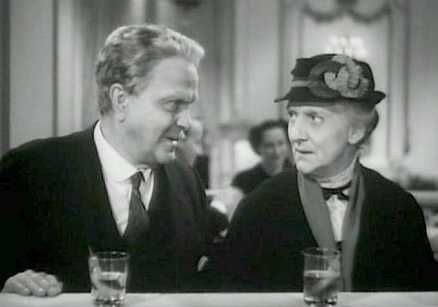 The other Victor Moore movie that's well worth a watch is Make Way For Tomorrow. Moore and Beulah Bondi (pictured at right) play a husband and wife who have been married 50 years but have to move out of their home. Unfortunately, they find that all of their children have very busy lives and none of them is able to take care of both parents, with the looming possibility that Dad is going to have to go out west for his health and Mom will have to go to an old folks' home.
The other Victor Moore movie that's well worth a watch is Make Way For Tomorrow. Moore and Beulah Bondi (pictured at right) play a husband and wife who have been married 50 years but have to move out of their home. Unfortunately, they find that all of their children have very busy lives and none of them is able to take care of both parents, with the looming possibility that Dad is going to have to go out west for his health and Mom will have to go to an old folks' home.
Toward the end of Moore's career, he played the justice of the peace who accidentally married a bunch of couples before he was legally entitled to do so in We're Not Married!, one of those Fox anthologies that's worth a watch. I can't recall whether I've actually seen We're on the Jury before, a movie which is a remake of the earlier Edna May Oliver film Ladies of the Jury, both about a woman on a jury who just knows the defendant is actually innocent and sets out to prove it. Unlike 12 Angry Men, these movies are comedies.
Posted by
Ted S. (Just a Cineast)
at
7:53 AM
0
comments
![]()
![]()
Monday, February 23, 2015
More on the Oscars and politics
So I brought up a bit of politics in my post yesterday mentniong the Oscars. I didn't watch the show, instead finally getting the chance to catch The Man Who Would Be King on TCM, a movie that's well worth a watch.
Earlier in the day, at dinner time, I had CNN on nd most of their "news" hour was the female presenter in studio talking with their correnspondent on the red carpet out in Hollywood. She did, however, also do an interview with a man who studied Oscar nominees and the political donations of the people who made those movies. Unsurprisingly, the donations skewed heavily toward the Democratic party and causes that would be associated with "Team Blue". Probably also unsurprisingly, the Best Picture nominee that skewed least this way was American Sniper. That having been said, it's certainly possible to make good movies regardles of one's political persuasion; I don't know the political leanings of a whole lot of the stars and directors that made the classic films we all know and love. A lot of those movies have little in the way of political sensibilities anyway.
The RSS feed for Australia's Radio National this morning included a report titled Oscars podium becomes political platform:
Today's Academy Award ceremony in Los Angeles became a platform for people to discuss womens rights, civil rights, privacy and immigration, but is any of that relevant when people are looking for an entertaining movie to watch?
Remember that Australia, being 19 hours ahead of Hollywood, sees the Oscars on Monday afternoon local time. That link leads to a transcript, if you want to listen to the audio, you can download it directly here, a 1.9 MB MP3 that runs about four minutes.
Posted by
Ted S. (Just a Cineast)
at
7:44 AM
0
comments
![]()
![]()
Sunday, February 22, 2015
The statuettes are out tonight
 So tonight is the night that Hollywood is actually giving away those Oscar statuettes. I have to admit that once again, I haven't seen the nominated movies. I live in the middle of nowhere, and my personal life means that I rarely get to go to the movies. The one thing I notice, though, is that neither Selma nor American Sniper seem to be getting the sort of buzz which indicates that they'd be big winners. I suppose that's not a bad thing since both of the movies seemed to have politicized kerfuffles surrounding them. Selma, of course is an Important Movie about The Black Experience, so to say anything bad about it is to commit the horrible sin of racism, just like it was a sin not to like Philadelphia because of the gay lead. In fact, I've found Philadelphia to be a movie that makes Guess Who's Coming to Dinner look subtle, and Guess Who's Coming to Dinner is a movie I don't particularly care for. I'm not a huge Katharine Hepburn fan, remember.
So tonight is the night that Hollywood is actually giving away those Oscar statuettes. I have to admit that once again, I haven't seen the nominated movies. I live in the middle of nowhere, and my personal life means that I rarely get to go to the movies. The one thing I notice, though, is that neither Selma nor American Sniper seem to be getting the sort of buzz which indicates that they'd be big winners. I suppose that's not a bad thing since both of the movies seemed to have politicized kerfuffles surrounding them. Selma, of course is an Important Movie about The Black Experience, so to say anything bad about it is to commit the horrible sin of racism, just like it was a sin not to like Philadelphia because of the gay lead. In fact, I've found Philadelphia to be a movie that makes Guess Who's Coming to Dinner look subtle, and Guess Who's Coming to Dinner is a movie I don't particularly care for. I'm not a huge Katharine Hepburn fan, remember.
As for American Sniper ZOMG it's not didactically anti-war!!!111!!! Or something like that. And it was directed by Clint Eastwood, who had the audacity to speak against St. Obama at the 2012 Republican National Convention! And there are a lot of people happy that it's pissing the Right People off. (Not that I voted for either Romney or Obama.) I only saw the commercials for American Sniper, and the impression I got from the commercials is that it looks tedious and mawkish. But of course, I'm not the biggest fan of war movies. The other caveat is that I got the same impression from the commercials for Steven Spielberg's War Horse (another film I'll admit I haven't seen). I don't remember any rending of garments over the politics of that movie.
For those who enjoy watching the Oscar telecast, have fun staying up past midnight. I've probably pointed it out before, but I've long not been a fan of the actual awards shows, what with the constant breaks for things like the Oscar-nominated songs, or people who clap during the Parade of the Dead. Or the unfunny jokes.
Posted by
Ted S. (Just a Cineast)
at
8:27 AM
1 comments
![]()
![]()
Saturday, February 21, 2015
Repeats for February 22, 2015
It's been ages since I've mentioned One Million BC, or at least, the 1940 version with Carole Landis. It's coming up tomorrow morning at 6:00 AM on TCM. There's not much of a plot, and what I wrote about it six years ago in that brief one-paragraph summary still holds. Prehistoric Boy meets Prehistoric Girl; the two fall in love even though they're from rival tribes. And then they have to deal with Prehistoric Animals of the sort that weren't roaming the earth at the same time as hominids. There's no historical accuracy here, but it's entertaining enough.
Over on FXM Retro, we get another airing of The Iron Curtain, tomorrow at noon. This one is the reasonably true story of Igor Gouzenko, a Soviet cipher officer at the USSR embassy in Ottawa, Canada, who starts to become disillusioned about his home country when he gets to know some Canadians. And then the Soviets are going to return him and his family home from his posting, and that's when Igor really begins to think about defecting.
The interesting thing about the post I linked to for The Iron Curtain is that I mentioned five years ago that it would be followed on the Fox Movie Channel schedule by Pickup on South Street. That's also the case on tomorrow's FXM Retro schedule. Pickup on South Street, which is a really good movie if you haven't seen it before, will be airing at 1:30 PM tomorrow.
Posted by
Ted S. (Just a Cineast)
at
7:46 AM
0
comments
![]()
![]()
Friday, February 20, 2015
The new hucksters
Another movie that's back on the FXM Retro schedule after a long absence is Madison Avenue. It's going to be on again early tomorrow morning at 3:00 AM if you haven't seen it before.
Dana Andrews plays Clint Lorimer, who at the beginning of the movie is working for the Jocelyn ad agency, run by JD Jocelyn (Howard St. John). The agency has as its biggest account the Associated Dairy Company, a conglomerate of dairies from across the country. Brock, the head of the company, suggests that Lorimer is a real up-and-comer. But unfortunately, Lorimer is going to be away from the agency for a few months, while he works on a special campaign for the Defense Department, learning about America's missile bases for a public relations campaign that's going to do... something or other.
It turns out that PR campaign is a macguffin. After the opening scene among Lorimer, Jocelyn, and Brock, the action switches to Wsahington DC, which we figure is going to be Lorimer starting that work with the Pentagon. But when he comes to the Filibuster Bar (yeah, what a dumb name for a bar, but it is Washington DC), we can tell from the cinematography that there's somebody else at the bar who's going to be important. That person is a lady reporter named Peggy Shannon (Jeanne Crain). She reminds Clint that he stood her up three months ago, which is our first indication that this action is at the end of Clint's time in Washington, not the beginning. The next clue is that when Lorimer complains that Jocelyn shafted him on his ideas for the PR campaign. In fact, that's precisely what Jocelyn did, since he was worried that Lorimer was going to take the Associated Dairies contract out from under him. He's firing Lorimer, to boot.
So Lorimer does get the idea to try to take the Associated contract, although that's going to be difficult since he hasn't even got a job. But he just happens to see a milk truck from the Cloverleaf Dairy, on which it's printed that Cloverleaf is a subsidiary of Associated. Lorimer finds out who has the ad campaign for Cloverleaf, and discovers it's the Tremaine agency, so he goes there with his ideas. Sadly for him, he learns that the founder of the agency has died, and it's now being run by the founder's daughter Anne (Eleanor Parker), and has been going to the dogs since Dad died. Lorimer sets out to make over the business, and make over Anne.
The Cloverleaf contract involves two people. Stipe is the guy who's really managing the company, mostly because the man who has the title of preisdent, Ames (Eddie Albert) is flaky. Ames dives a milk route himself and flies remot controlled helicopters. Interestingly, he gets one interesting line when he suggests that in the future, milk will be delivered by larger versions of such helicopters. In real life, drone technology has advanced to the point where companies like Amazon are thinking about delivering things by drone. But this nutcase is the man Lorimer has to build up.
Lorimer sets out to work, and eventually things start going right for him, when Ames becomes an unexpected hit giving a speech at the business. This sets Ames on his rise, eventually to take over Brock's job at Associated when Brock is kicked upstairs. This is just what Lorimer wanted, because it means that now he's sure to get the Associated contract. Or maybe not. Along the way, everybody has started stabbing everybody else in the back, once once Ames leaves for the head office, the plot really gets complicated.
Unfortunately, Madison Avenue fizzles out at the end, giving an ending that just doesn't fit. Everybody tries their best, though, and you can't really fault the acting. But Dana Andrews is already looking a bit haggard, and Jeanne Crain is given some horrendous outfits and hairstyles to wear. Combined with the writing, the result is a movie that's sadly less than the sum of its parts. Still, you should probably give it a watch, if only to judge for yourself. And the good thing is that it only runs 90 minutes. If it were made nowadays, it'd probably be bloated to over two hours.
I'm not certain if Madison Avenue is available on DVD, so you're going to have to catch the FXM showings.
Posted by
Ted S. (Just a Cineast)
at
3:28 PM
0
comments
![]()
![]()
Labels: Dana Andrews, Eleanor Parker, Fox, Jeanne Crain
Thursday, February 19, 2015
Movita Castaneda, 1916-2015

Movita in Paradise Isle (1937)
Movita Castaneda, who played Franchot Tone's love interest in the 1935 version of Mutiny on the Bounty and later married Marlon Brando, died last Thursday at the age of 98. Although she died a week ago, most of the obituaries seem to have been published in the last day or so, which is why I never noticed it or posted an obituary here myeelf.
Among her early roles was in Flying Down to Rio, which has her singing the Carioca, a song which is more famous for being the dance number that brought together. She was born with the name Maria Luisa, but some studio executive decided that the name Movita looked more exotic. Being of Mexican descent gave her a look that the studio executives figured could pass for tropical, so she wound up in Mutiny on the Bounty, the pictured Paradise Isle, and John Ford's 1937 film The Hurricane. I have to admit to not remembering her in Red Light or Dream Wife.
She met Brando in the early 1950s, and after a long relationship actually married him for a couple of years in the 1960s, although Brando was apparently not the best man to be married to. They had two children together, both of whom survive her.
Posted by
Ted S. (Just a Cineast)
at
3:05 PM
0
comments
![]()
![]()
Labels: Obituary
Before the Oscars
Another day where I really couldn't think of anything good to post about. There are any number of movies I've seen recently and probably ought to do a full-length post about, and in fact I thought about doing a full post on Buster Keaton's Seven Chances. But the DVDs on which it's available are all fairly monstrously priced. It would be bad enough to get a two-hour movie at a price like $30, but Seven Chances runs a little over 50 minutes. And it's not in the public domain either, having been released in 1925.
So I did a Youtube search on "Fatty and Mabel", since Roscoe "Fatty" Arbuckle and Mabel Normand made a bunch of short films together back in the 1910s, and anything before 1923 should be in the public domain. Youtube duly spat out a couple of videos of Fatty and Mabel Adrift, which I hadn't seen before. The videos all seem to be in a 16:9 aspect ratio, although from not having actually watched the movie yet (streaming video doesn't play nicely with my satellite internet connection), I couldn't tell if it's pillarboxed or stretched. The one I've posted below looks pillarboxed, but the establishing shot photo makes it bit hard to tell, especially from the other versions available. (Does Youtube allow 4:3 uploads any more? I don't post to Youtube, of course.) I also don't know the proper original tinting, or if there even was any tinting.
Posted by
Ted S. (Just a Cineast)
at
7:25 AM
0
comments
![]()
![]()
Wednesday, February 18, 2015
I guess today *is* Ash Wednesday
Would you believe I only noticed today that TCM's schedule for the morning and afternoon of religious-themed movies corresponds with Ash Wednesday, the start of the the pre-Easter Lenten season, what with all those movies about Catholic clergy, ending with a film about the ultimate Christian of them all: The Greatest Story Ever Told at 4:15 PM. FXM is getting in on the action too. Esther and the King at 10:30 AM is biblical although I don't know that it's necessarily germane to Ash Wednesday. But that's followed at 12:20 PM by The Song of Bernadette, the story of Bernadette or Lourdes who claimed to see the Virgin Mary in a grotto in the Pyrenees Mountains. (You'll actually find her at your local Walmart next to Elvis Presley.)
Yesterday was Mardi Gras, and noting that today is Ash Wednesday, I also started thinking this morning of films with scenes involving the pre-Lenten celebrations. There is actually a movie called Mardi Gras, one of those Fox musical comedies from the late 1950s and early 1960s when Fox was trying to showcase one young pop/rock singer or another. Here it's Pat Boone; Fabian would show up in some of the other movies. I haven't seen it, in part because FXM hasn't taken it out of their vaults since I don't know when, and partly because I'm not interested in those Pat Boone or Fabian movies all that much.
As for other Mardi Gras movies, there's also Carneval in Brazil, which immediately made me think of Black Orpheus, telling the story of Orpheus and Eurydice set against the backdrop of Carneval. A movie that's lovely to look at, and a pretty good story too. Edgar G. Ulmer's low-budget Her Sister's Secret, which showed up on TCM when they had a night of Edgar Ulmer movies including a documentary about him, starts off at Mardi Gras with a soldier falling in love with a woman and geting her pregnant, only to return from the war unable to find the woman.
IMDb lists a couple of studio movies from before the war that supposedly have Mardi Gras scenes, but I can't remember the extent to which the Mardi Gras shows up. I think I've only seen the end of the Wheeler and Woolsey comedy Dixiana, since their early movies tended to have two-strip Technicolor finales and I'm always interested in seeing two-strip Technicolor more than I am in watching 90 minutes of creaky musical comedy. Bed of Roses is listed as having a Mardi Gras scene. I know it's set in New Orleans at least in part; I can't recall whether it actually shows the Mardi Gras. And then there's the Bob Hope comedy Louisiana Purchase.
For a less timely celebration, you could watch the Christmas party and New Years Eve celebrations in The Apartment, at 8:00 PM this evening on TCM. With the weather we're having, however, I think I'd rather see a 4th of July celebration.
Posted by
Ted S. (Just a Cineast)
at
8:12 AM
0
comments
![]()
![]()
Tuesday, February 17, 2015
Shorts report for February 17, 2015
Since I've bloged about quite a few of the features that are coming up on TCM over the next day or so, or else haven't seen them, it's time to take another look at some of the shorts that are coming up.
First up is Sword Fishing, at about 11:47 PM tonight following Ben-Hur (8:00 PM, 222 min plus an intro and outro). This one sounds from the title and synopsis as though it's going to be a Pete Smith short, but in fact it was made at Warner Bros. It features Howard Hill, the archer who stood in for Errol Flynn in the archery contest scene in The Adventures of Robin Hood, displaying his archery skills by fishing with a specialized harpoon. Narration was provided by Ronald Reagan, who was still climbing the ladder at Warner Bros.; this would have been a few months after his supporting performance in Dark Victory hit the screen.
Early tomorrow morning at about 4:24 AM, following Sunrise at Campobello (2:00 AM, 144 min) is Main Street on the March!. This is a John Nesbitt Passing Parade short, which was originally conceived to lok at the risks of staying neutral in the war that was going on over in Europe, by looking at the way Main Street was reacting to the evnets going on overseas. It was scheduled to go into release in December, 1941, but those plans were screwed up by the Japanese attack on Pearl Harbor, forcing Nesbitt to change the narration now that the US was in the war. (I'm reminded of how 49th Parallel was conceived to get still-neutral America on the UK's side, but was only released in early 1942.) Later in the war, John Nesbitt made a sequel called Main Street Today, that "today" being 1944; that short shows up tomorrow evening at about 7:39 PM.
Posted by
Ted S. (Just a Cineast)
at
7:51 AM
0
comments
![]()
![]()
Labels: Short
Monday, February 16, 2015
Louis Jourdan, 1921-2015
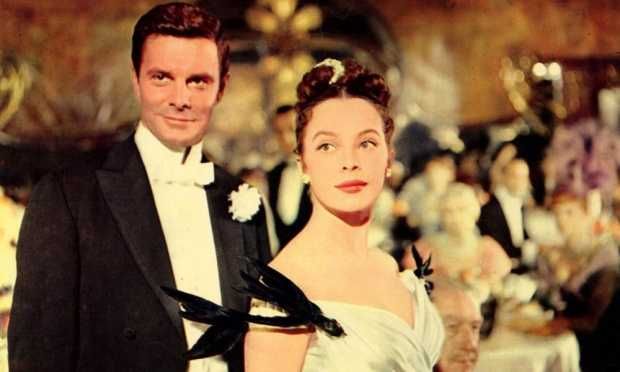
Louis Jourdan with Leslie Caron in Gigi (1958)
The death has been announced of actor Louis Jourdan, the French-born actor who achieved success in Hollywood in the 1940s and 1950s. Jourdan, who died Saturday night, was 93.
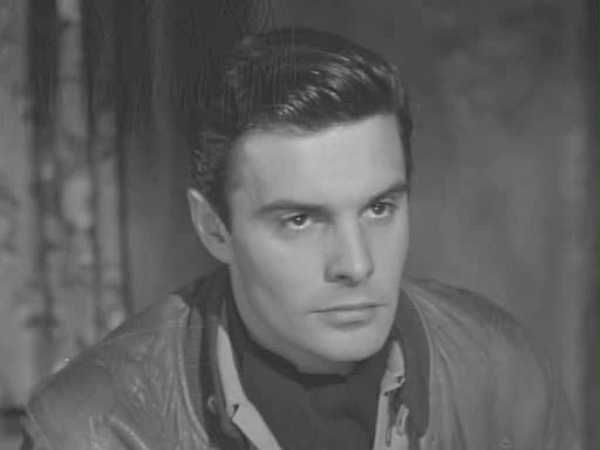
Jourdan, having been born in France, started his acting career in France duing the war, but came to Hollywood after the war to appear in his first English-language film, The Paradine Case. Directed by Alfred Hitchcock, the movie stars Gregory Peck as a London barrister who takes the defense of a woman accused of murdering her husband (Alida Valli) only to fall in love with the woman, which is a big complication considering that he's already married. Jourdan plays the valet to the deceased, who may or may not be in love with Valli and who may or may not know more about the murder. This is one of Hitchcock's lesser-known movies, which is a surprise considering the stellar cast: Charles Laughton plays the judge, and Charles Coburn plays Valli's solicitor.
Jourdan had a reputation for being suave, which probably came from his role in Gigi, where he plays the man being pursued by Leslie Caron (pictured above). This is one of those movies I don't particularly care for, mostly because it's an overblown MGM musical. That, and Maurice Chevalier's opening rendition of "Thank Heaven For Little Girls" is something I find creepy. Gigi happens to be on the TCM schedule overnight tonight at 1:00 AM, so you'll have a chance to watch and judge for yourself.

Later in his career, Jourdan played the bad guy in the James Bond movie Octopussy, which involves Bond trying to defuse an atomic bomb while having to deal with the dispute between East and West Germany. At least, I think that's the main story line; it's been a long time since I watched Octopussy.
Elsewhere on this blog, I've recommended Louis Jourdan in Letter From an Unknown Woman and Julie.
Posted by
Ted S. (Just a Cineast)
at
3:00 AM
0
comments
![]()
![]()
Labels: Louis Jourdan, Obituary
Sunday, February 15, 2015
"Ida" exhibition in Łódź
One of my RSS feeds from Polish Radio contained the following item at the end of last week:
"Ida" exhibition in Łódź
The Museum of Cinematography in Łódz has staged an exhibition documenting the production process of the film and its worldwide popularity.
I haven't seen the film Ida, but it's up for an Oscar for Best Foreign Language film at this year's Academy Awards. The page at Polish Radio seems to give away a bit more of the story than the IMDb page, but I'm just guessing since as I've said I haven't seen the movie. If the link to the Polish Radio page doesn't work, which might be a bit of a problem because it's got some odd characters in it, you can download the audio of the interview here; it runs about 3:30 and 3.1 MB. The Polish Radio page is not a transcript of the interview.
The Łódź Museum of Cinematography has a brief bit about the museum in English here, but it seems as though the real information about the site is only available in Polish. If my reading of the site is correct, then I think the "Ida" exhibition is on until May 31. (I studied Russian, so I can generally make a bit of sense of headlines and other things in other Slavic langauges. But Polish orthography is quite different from the orthography of the other Slavic langauges that use the Latin alphabet, and Polish is one of those languages that doesn't use the Latin names of the months.)
Posted by
Ted S. (Just a Cineast)
at
4:18 PM
0
comments
![]()
![]()
Labels: Foreign
Gale Sondergaard-1899-1985
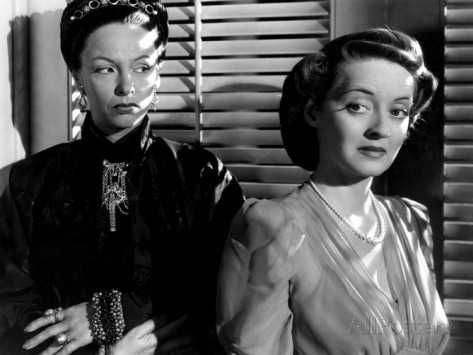
Gale Sondergaard (l.) and Bette Davis in The Letter (1940)
Today marks the birth anniversary of actress Gale Sondergaard, who was born on this day in 1899. She started off on the stage, and supposedly didn't have any intention of going to Hollywood, except that her husband, a director, went west and she followed him. It turned out to be serendipitous as Sondergaard was nominated for a Best Supporting Actress Oscar in her very first film, Anthony Adverse; in fact, she won that award. She then proceeded to have an active career for a dozen years until the government panicked that there might be Communists in Hollywood. She was one of many people dragooned into appearing before Congress (her husband was one of the Hollywood Ten), and when she refused to testify, nobody would hire her again.
In addition to her Oscar-winning role in Anthony Adverse and the pictured The Letter above, you might want to look for her as Alfred Dreyfus' wife Lucie in The Life of Emile Zola or as Empress Eugenie in Juarez.
Posted by
Ted S. (Just a Cineast)
at
7:56 AM
0
comments
![]()
![]()
Saturday, February 14, 2015
Another not-so-good 60s style movie
FXM has been running Modesty Blaise quite a bit recently. You've got another chance to catch it tomorrow morning at 3:30 AM.
 Monica Vitti plays the title character, a super-spy originally in a series of comic books. That's her on the left; that's one nutty outfit. But being a spy, Modesty goes through a series of 1960s outfits and hairdos. She's got a partner in the form of Willie (Terence Stamp) who helps her solve the crimes and keep the world safe from evil. In this movie, the evil involves Gabriel (Dirk Bogarde), who's smuggling diamonds for oil or something. The plot seems to be secondary to the stylized action, which is something that made the movie difficult for me to watch. Gabriel has a henchwoman in Mrs. Fothergill (Rossella Falk), who trains the underlings at that Mediteranean island hideout.
Monica Vitti plays the title character, a super-spy originally in a series of comic books. That's her on the left; that's one nutty outfit. But being a spy, Modesty goes through a series of 1960s outfits and hairdos. She's got a partner in the form of Willie (Terence Stamp) who helps her solve the crimes and keep the world safe from evil. In this movie, the evil involves Gabriel (Dirk Bogarde), who's smuggling diamonds for oil or something. The plot seems to be secondary to the stylized action, which is something that made the movie difficult for me to watch. Gabriel has a henchwoman in Mrs. Fothergill (Rossella Falk), who trains the underlings at that Mediteranean island hideout.
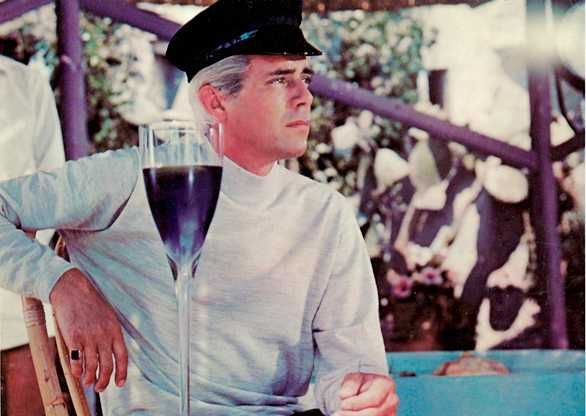
As you can see, there's quite a bit of style going on here. Look at that wine glass, which yes, is on a ridiculously long stem. There's a scene in which Gabriel and his accountant are both served drinks in such glasses, with the drinks being ridiculously colored. I didn't care for the movie, but it sure is interesting to look at. In addition to all that 60s style and fashion, there are a lot of locations which are as they were back in the 60s. Then again, I've mentioned before that I always find it interesting to watch the set and art design of contemporary movies looking at things as they presumably really were back in the day, especially the 1960s. Look, for example, at the lighting fixtures in Point Blank, as Lee Marvin walks through the airport terminal:

There's also that roadside snack bar in In the Heat of the Night, with its dim fluorescent lights. Looking at such stuff shows how much more prosperous we as a society are today, but damn if there aren't a lot of interesting visuals in those 1960s films. By the same token, I studied Russian in St. Petersburg back in 1992, just after the fall of the Soviet Union. Somewhere along the way the faculty of the section we studied at gave each of us a set of photos designed for sale to tourists that wsa an obvious holdover from the Soviet days. The photos of the main drag, Nevsky Prospekt, are interesting, with its dim neon signs advertising a bunch of understocked stores each selling a different item. Poor as hell, and not nearly as garish as the Times Square we can see in 50s color movies, but it's still visually interesting. I'll have to see if I can scan it sometime.
Posted by
Ted S. (Just a Cineast)
at
8:11 AM
0
comments
![]()
![]()
Friday, February 13, 2015
Another set of movies back after long absences
It's been closing in on six years since I blogged about Roman Holiday. I think TCM must have gotten the rights to show it again from the beginning of this year, becuase it's showing up a couple of times in quick succession, at least by TCM's standards. It was on back on January 12; it's going to air again tonight at 9:45 PM, and is scheduled to be one of the Essentials in the new season. To be fair, it's a wonderful movie well worth a viewing if you haven't seen it before.
"Quick succession" means something different over on FXM, where you can easily have a movie end one morning's Retro block of programming and then show up the first thing in the next morning's. House of Strangers, which I blogged about back in 2011, was on FXM Retro this morning, although by the time you read this post you'll have missed it. Fear not; you'll have another chance to se it tomorrow morning at 4:00 AM. Richard Conte plays the spoiled son in a family of Italian immigrant bankers headed by Edward G. Robinson; his three brothers resent it.
And then there's Tampico, which I've briefly mentioned but never done a full-length post about. That's largely because I haven't gotten around to watching any of the Fox Movie Channel/FXM Retro airings when it's been on, at least not for quite a few years. It was on yesterday, and shows up tomorrow morning at 9:45 AM. Edward G. Robinson shows up again, this time as the captain of an oil tanker plying the Gulf of Mexico during World War II. He picks up a group of survivors from a boat torpedoed by the Nazis, and then has reason to believe that one of the survivors may be a Nazi collaborator herself. Oh, and he's already fallen in love with her!
FXM also repeats movies in prime time, although I think I've posted before that there's an understandable strategy for running stuff multiple times on the same evening in prime time. It's still easier for a lot of people to turn on a TV and watch whatever's on, rather than go through programming a DVR. With first-run programming, there's also something to be said for being able to talk about it at work the next morning. For cable channels, it's just as easy to run a show twice, with the first airing being at a good time for people on the east coast, and the repeat being about the same local time for folks on the west coast.
Posted by
Ted S. (Just a Cineast)
at
8:21 AM
0
comments
![]()
![]()
Thursday, February 12, 2015
Is it a TCM premiere
TCM is running The Gunfighter tonight at 8:00 PM. I'm not certain, but I think it's a TCM premiere. Gregory Peck plays the titular gunfighter who would like to settle down and live a quiet life not having to be a gunfighter any longer, but finds that his reputation precedes him wherever he goes. I blogged about the movie back in November 2011, and find the more I think about it that this isn't an uncommon theme in the movies.
Glenn Ford played a similar character in The Fastest Gun Alive, although here the gunfighter character had already been able to settle down for a couple of years before somebody spills the beans. And thankfully, The Gunfighter doesn't have a dance scene with Russ Tamblyn. I thikn The Gunfighter also has a better ending than The Fastest Gun Alive.
John Wayne wants to settle down in The Shootist, but that's because his character is terminally ill. He's going to be settling down soon regardless of what happens.
Feel free to discuss other westerns about gunfighters wanting to settle down in the comments.
Colin over at Riding the High Country just wrote a lengthier post on The Gunfighter the other day, and as one of the bloggers who specifically likes westers, his is a much better post than mine and well worth reading.
Posted by
Ted S. (Just a Cineast)
at
7:48 AM
0
comments
![]()
![]()
Wednesday, February 11, 2015
Briefs and a history lesson
I'm surprised nobody noticed the other day when I posted about Reagan's birthday a day late. In my defense, I was thinking it was actually the 6th when it was actually the 7th. Life's been hectic lately, which will explain the even more erratic than normal quality of the posting and making stupid mistakes like that.
It'll also explain why I missed that Charade was on yesterday evening. I saw the film at the end of last month when TCM ran it as part of a night of Henry Mancini scores, and had wanted to blog about it when it showed up again. Somehow, I just didn't see it on the schedule. At least it's coming up again in April.
TCM's schedule page claims that All the King's Men, airing tonight at 8:00 PM, is not available on DVD from the TCM shop. Amazon lists it as being available in limited quantity, which would imply that the DVD is now out of print. They also claim it's available via instant streaming, which of course I don't do being on satellite internet. Don't mix it up with the 2006 remake.
Not being able to think of anything to blog about today, and with thankfully nobody dying to write an obituary post about, I looked through this day in history. In 1531, English King Henry VIII was recognized as the ultimate head of the Church of England. This period has been covered in a couple of movies, with the most notable being A Man For All Seasons. I think the Charles Laughton look at Henry VIII's life, The Private Life of Henry VIII, starts off just as Henry is having Anne Boleyn executed. Anne is the subject of Anne of the Thousand Days, but I haven't seen that one in a while and can't remember where in the whole religious conflict with Rome that one begins.
Our other event in history also deals with Catholicism. On February 11, 1858, Bernadette Soubirous had what she claimed was a vision of the Virgin Mary in Lourdes, France. This was given the Hollywood treatment in 1943 with The Song of Bernadette, which won Jennifer Jones a Best Actress Oscar. I'm reminded of something that happened in my high school German class. We were supposed to write in German in a journal every day for the first few minutes, and one day I was writing about something I had seen on TV the previous night that I thought was tacky. Of course, I didn't know the German word for "tacky" (apparently the word I wanted was geschmacklos which literally translates as "tasteless"). My German teacher asked me why I wanted to know, so I mentioned that I had seen a TV show the previous night about Lourdes, and how there were people selling little plastic Virgin Marys that you could unscrew the crown from and fill with holy water. My teacher thought, and finally responded, "That is tacky." She never did tell me the word for tacky.
Posted by
Ted S. (Just a Cineast)
at
8:04 AM
0
comments
![]()
![]()
Tuesday, February 10, 2015
The Bachelor and the Bobby-Soxer
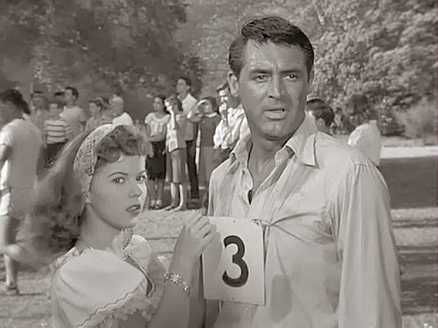
Shirley Temple and Cary Grant in a scene from The Bachelor and the Bobby-Soxer (1947)
Apparently I haven't done a full-length post on The Bachelor and the Bobby-Soxer before. It's coming up on TCM overnight tonight (or early tomorrow morning) at 2:45 AM, so now is a good time to do that post.
The titular bachelor is Richard Nugent, a playboy artist played by Cary Grant. He's consistently winding up in court prosecuted by assistant district attorney Tommy Chamberlain (Rudy Vallee) for the sorts of crimes that would be TMZ fodder nowadays: nothing for which he should end up with a substantial jail sentence, but annoying for everybody all around. He's brought up before Judge Margaret Turner (Myrna Loy). She's got problems of her own. She's got a much younger sister Susan (Shirley Temple) at home that she's taking care of because the parents are presumably dead. (With a kid sister 22 years younger, you can understand why the parents would be dead by now.) Susan mat Mr. Nugent when he came to her school do give a lecture on art, and she unsurprisingly developed a crush on this man who is so much more worldly and better looking than the gawky, pucescent classmates she sees around her every day. Still, Margaret understands that there's no way thi crush could successfully become a real relationship, especially consideirng that Nugent wouldn't want these young girls pursuing him.
So it gives the good judge an idea: sentence Nugent to be Susan's escort for a while! It'll disabuse Susan of any notions she has about Nugent once she has to spend a lot of time with him, and it will teach him a few things about responsibility. Why any defense lawyer would permit this is beyond me, but perhaps Nugent thought all the other alternatives were worse. Besides, he's got a plan of his own. He escorts Susan, but starts acting as though he enjoys doing this, and tries to do what he can to make the "responsible" adults regret their decision to come up with this "punishment". Now, he does it all in a classy way, of course, and nothing at all illegal, which I'd think would drive the judge and the people around her up a wall. Especially when you consider that Nugent's actions don't seem to be doing anything to make Susan fall out of love with him.
Along the way, one other thing happens that you can probably guess from a movie like this: Judge Margaret finds herself beginning to fall in love with Nugent. It doesn't help that the ADA has had his eye on the judge. Can anybody say conflict of interest? Of coure, The Bachelor and the Bobby-Soxer is light comedy, and never meant to be anything with any sort of message, so we can overlook how the film has no grounding in any sort of reality.
The ultimate result is a movie that's frothy, but a hell of a lot of fun. We all knew that Cary Grant was one of the great comic actors, as he'd been doing roles like this for a decade or so. Myrna Loy also does extremely well as the more grounded character, but still adept at comedy nonetheless. The Thin Man, after all, was a full 13 years before The Bachelor and the Bobby-Soxer. The surprise is Shirley Temple, who shows little of the qualities that made her endearing in all those movies she did at Fox, but here would be terribly inappropriate. Her character isn't an adult, but is not childish by any stretch of the imagination. And Temple does well playing off of Grant in their scenes together.
And then there's the screenplay. It was written by Sidney Sheldon, who won an Oscar for it. My first memory of Sheldon was in the late 1970s or early 80s with the ads for the novel Rage of Angels, which sounded so grown-up and trashy. (I've never read the book.) And then when I watched TV reruns I saw I Dream of Jeannie and noticed that it was created by... Sidney Sheldon. And then many years later I saw this. An interesting career, to say the least.
The TCM Shop lists The Bachelor and the Bobby-Soxer as being available on one of those four film box sets, focusing on Cary Grant.
Posted by
Ted S. (Just a Cineast)
at
8:17 AM
2
comments
![]()
![]()
Labels: Cary Grant, Myrna Loy, Shirley Temple
Monday, February 9, 2015
And the Oscar goes to...
Magnus Wrenninge. Well, it's a technical Oscar, and not a competitive Oscar. So Wrenninge isn't going to receive one of those traditional statuettes that we think of when we think of the Oscars; instead he'll be getting a plaque. The plaques aren't going to be given out on the televised portion of the ceremony, since the Academy thinks people care more about hearing the crappy songs that have been nominated than about technical aspects of moviemaking. Gotta keep the show from running more than 87 hours, after all.
The link above contains a button to play the streaming audio of an interview with Wrenninge, which runs to about nine minut4es. Wrenninge discusses his career and the achievement which earned him the Oscar, a library of digital effects to be used in the special effects portions of movies. Streaming audio doesn't want to play nicely with my browser, however, so I don't know if that link actually works for other people. The interview aired as part of this past Friday's (Feb. 6) English-language half-hour program, and that's available for download here, a download of about 27 MB. Radio Sweden keeps its audio archives available for download for 30 days, so you've got about four weeks left to download it if you want to hear the interview and the rest of what was going on in Sweden this past Friday.
Posted by
Ted S. (Just a Cineast)
at
2:00 AM
0
comments
![]()
![]()
Sunday, February 8, 2015
God (or Hollywood screenwriters) save Tyrone Power!
Another movie I watched this morning on FXM Retro and which gets another airing in the very near future is Captain From Castile. The repeat airing is on tomorrow morning at 7:25 AM.
The movie starts off with a bunch of men on horses with dogs out on a hunt, which if you were in England you might assume was a fox hunt. But this is Spain in 1518, and they're actually hunting a human, a slave from one of Spain's colonies in the New World who has escaped. Meeting up with that party is Pedro de Vargas (Tyrone Power). He suspects the fugitive has gone north while everybody else expects him to head for the nearest coast to the south, so Pedro goes off on his own to take part in the search. It's then that he meets Catana (Jean Peters). Catana is a servant girl out to do the laundry for the local inn, and because Catana and Pedro are of very different upbringing, Pedro doesn't believe Catana until he searches her bundle. Pedro then finds that he knows the fugitive and lets the fugitive escape, before running into Catana again.
Pedro eventually accompanies Catana back to the inn where she works, which is where he meets Juan Garcia (Lee J. Cobb). Garcia has been to the New World, and claims that there's all sorts of gold and other fortune to anybody who is brave enough to go there and make his fortune for himself. Sounds nice, but Pedro has parents and a kid sister he loves, as well as a girlfriend named Luisa. But, this being 1518, all of this is foreshadowing. The slave was owned by Diego de Silva (John Sutton), who is also the head of the local branch of the Spanish Inquisition. (You didn't expect that, did you?) Diego shows up at the Vargas residence, and basically gets in a heated debate with Dad over the Inquisition, which Dad thinks is iniquitous. Diego gets his revenge by having the entire Vargas family arrested, which results in the daughter being tortured to death.
Ah, but Pedro has friends, and they're able to affect the family's escape. One of those friends is Catana, who immediately started lusting after Pedro from the moment she saw him. To get help for the Vargas family, though, she had to betroth herself to the man helping them. So she tries to figure out a way to avoid going with that man, and escaping with the Vargas family. However, that escape involves Pedro getting split up from his parents. To keep making his escape, he has to go on an expedition to the New World with Hernando Cortez (Cesar Romero). Mind you, we're almost an hour into the movie by the time all this has happened.
Cortez leads the expedition by setting off from Cuba, which is already an established Spanish province, although Havana here looks more like the sets the studios would use for Mexico. Cortez finds rcches in Mexico, but he's been having a dispute with the colonial governor of Cuba, some of the men in the expedition are on the governor's side, so Cortez has to burn all the ships and keep everybody in Mexico. Meanwhile, Catana is still lusting after Pedro, who does finally profess his love for her. Help eventually does come in the form of an armada, but who should be on that armada? Why, none other than de Silva, looking to bring the Inquisition to the New World!
Captain From Castile is an interesting idea, but it's overly long -- at 140 minutes, the studio could probably have come up with a tighter script and chopped a good half hour off the running time. The othe rbig problem is that the movie seems overly melodramatic, veering from one crisis for Pedro to another. The guy cheats death something like half a dozen times. Sure, one of them is a duel, but on three or four occasions he's literally on his deathbed. And then there's the casting. Lee J. Cobb as a Spaniard searching for his fortune in the New World? Boy does he try, but he sticks out like a sore thumb in all his scenes. And then there's the priest on Cortez' mission. It's Thomas Gomez, who was good in a bunch of supporting roles. Here, though, he's got a terrible wig that distracts from his performance.
The bright side of the movie is the scenery. The Spanish scenes are all very likely done wherever the studios did their westerns back before John Ford went off to Monument Valley. But the film helpfully tells us between the opening credits and the first scenes that they had the assistance of the Mexican government in filming Mexican scenes on location in authentic locations. I'm not certain just how authentic those locations are in actually being from Cortez' life and conquering missions, but they're very nice to look at. Being filmed in Technicolor really helps, too.
Overally, I'd recommend Captain From Castile for its entertainment value if it clocked in under two hours. I say that even with the "will he cheat death" melodrama. But as it is, being 140 minutes, you should be forewarned that it's going to be a bit of a slog.
Posted by
Ted S. (Just a Cineast)
at
2:02 PM
0
comments
![]()
![]()
Labels: FXM, Tyrone Power
Saturday, February 7, 2015
Lizabeth Scott, 1922-2015
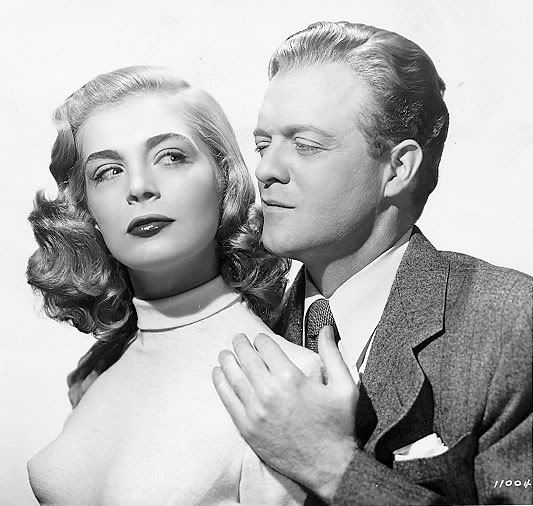
Lizabeth Scott and Van Heflin ina publicity still from The Strange Love of Martha Ivers
Actress Lizabeth Scott, who played a femme fatale-type in a series of movies in the 1940s and 1950s, died last Saturday at the age of 92, although news of her death was only released yesterday evening. One of Scott's earliest notable roles was as the second woman in The Strange Love of Martha Ivers, that being the woman that Van Heflin meets after he returns home and finds his old childhood friends (played as adults by Barbara Stanwyck and Kirk Douglas) married to each other.
One of Scott's movies that I haven't mentioned before is Dead Reckoning, which I only saw on the defunct Cinemoi channel during the channel's brief appearance on DirecTV. In that one, Humphrey Bogart stars as an army veteran returning home from WOrld War II with his hero buddy, who goes missing. Bogart investigates, and finds a bunch of crime and Lizabeth Scott possibly involved -- or at least hiding knowledge of the crime -- when he goes to his buddy's old home town. The plot is a bit convoluted, but everybody pulls it off enough to make the movie entertaining and worth a watch.
Since TCM is in 31 Days of Oscar right now, any programming tribute to Scott wouldn't be until March at the earliest.
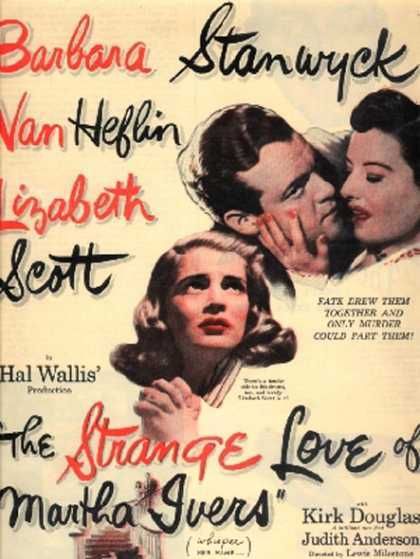
Posted by
Ted S. (Just a Cineast)
at
8:19 PM
0
comments
![]()
![]()
Labels: Obituary
King of the Khyber Rifles
Today at lunchtime I had the opportunity to watch King of the Khyber Rifles on FXM Retro. It's on again tomorrow morning at 8:45 PM, and is worth a watch if you haven't seen it before.
The setting is British India in 1857, which for those of you who didn't study India in any of your high school history classes was the year of the Sepoy Mutiny (among other names). Indeed, just after the opening credits we get a scene of one of the hill tribes in the northwest of India (now the northwestern part of Pakistan on the border with Afghanistan) ambushing a group of British soldiers, led by Captain King (Tyrone Power). The ambush is repulsed, and King makes his way to the garrison where he's been stationed as part of his new orders.
Controversial wouldn't be the right word to describe Capt. King, but he's certainly not the most popular person in the military. That's because of his parentage. His father was British and stationed in India, where he met and fell in love with one of the natives, a Muslim woman in Peshawar. This led hi mother's family to disown her, and led his father's family not to like him, either. The two of them were both killed in an uprising in 1833 (watch for the anachronism of photographs of the two), and the only person who would take them in was a wealthy Muslim businessman, who when his biological son and foster son grew up, abandoned everything to become an imam. Hassan, the biological son, fled for the mountains and became Karram Khan (Guy Rolfe), the man leading the rebel forces in this area of India.
Meanhwile, back at the garrison, King meets his new commander, General Maitland (Michael Rennie). Maitland has an adult daughter Susan (Terry Moore), who has followed her father out to the middle of nowhere because otherwise we wouldn't have a major plot point. Susan falls in love with the good Capt. King, and in many ways the feeling is mutual even if King doesn't exactly express his feelings for her. Of course, there's no way Susan can ever have Capt. King because of the ethnic differences: King is "half-caste" (cue that Cher song), and Dad simply won't let her marry him.
I mentioned at the beginning that there's a rebellion coming, and that's what drives the last third of the movie. The British are set to get a shipment of a new, more technologically advanced rifle. However, to operate the rifle, solders have to bit the end off the cartridges. Rumor spread that the cartridges used grease that was based on beef or pork fat, which would be anathema for the non-cow-eating Hindus, and especially out of bounds for the Muslims who couldn't use any pig products. At least, that's the rumor that spread among those who were working under the British; Karram Khan's rebels had no such rumors and wanted the rifles for their own use. (There really was such a rumor; Karram Khan is wholly fictional.) King tries to kill Khan himself basically by deserting, and when that doesn't work is eventually allowed to lead a group of natives who take on Khan and his forces in a climactic final battle.
King of the Khyber Rifles breaks no new ground, having a fairly predictable plot of material that we would have seen in a whole bunch of westerns, only with the action transplanted to 19th century India. Indeed, a lot of the exteriors look like they could have been the locations for a traditional western. Still, the movie is entertaining enough. I only wish FXM could get a better print. The opening and closing credits are in the correct Cinemascope aspect ratio, but the rest of the movie has been panned and scanned to about a 5:3 ratio. Not 4:3 for old TVs or 16:9 for modern TVs, but something in between (I actually measured). The sound also sounds all wrong, echoic in many scenes as thouh it was obviously added in post productoin, even for some exterior scenes that could have been done on a sound stage. And some of the scenes suddenly change to having a slightly greenish hue.
Posted by
Ted S. (Just a Cineast)
at
2:01 PM
0
comments
![]()
![]()
Labels: FXM, Tyrone Power
Briefs for February 6, 2015
I apologize that the posting hasn't been up to even the normal quality lately. I'm in one of those areas that actually has to deal with winter, and although that "great blizzard" of two weeks ago that hit Boston with a vengeance just missed us, there's been enough to do this winter. Being seven years into blogging, and finding that a lot of the movies on the schedule are ones I've arleady blogged about, also has something to do with it.
Today's Ronald Reagan's birthday, isn't it? It's too bad that the B movies he made at the beginning of his career never got nominated for any Oscars because as I've commented before, a lot of those are quite fun. It helps that Reagan was at Warner Bros, since I think they had the best B movies of all the ones I've seen. Granted, TCM doesn't get much of the B movies from Paramount or Universal so I can't judge those, but I tend to prefer the Warner B movies to either MGM or RKO, and what little we've gotten from Columbia or Fox.
London Can Take It!, which I blogged about back in May of 2012, is on the TCM schedule at 7:50 PM today. If you hacen't seen this one before, I think it's certainly woth a watch, taking a look at London well before the US got involved in World War II. The bombings of London had already come to the screen in the finale of Foreign Correspondent four months earlier, but London Can Take It! is much more real.
And then there's Strauss Fantasy, airing tomorrow morning at 10:31 AM on TCM. I don't think I've seen this one, but I find myself wondering how it can be that much better than Capriccio Italien, which I brought up last summer. One of the IMDb reviewers suggests this might be in a wider aspect ratio than Capriccio Italien, although the IMDb page doesn't give any information. It's just the MGM orchestra playing a medly of songs by various members of the Strauss family.
Posted by
Ted S. (Just a Cineast)
at
7:18 AM
0
comments
![]()
![]()
Friday, February 6, 2015
Mary Healy, 1918-2015
I missed that the death of actress Mary Healy was reported on Wednesday. Healy was 96.
 Healy is one of those people who did more work on Braodway, and early TV, than she did in movies, which might be one of the reasons I didn't recognize the name. Probably her best known movie credit would be in The 5000 Fingers of Dr. T, in which she played the mother of the Tommy Rettig character. Healy was married for 58 years to actor Peter Lind Hayes, who played the good guy handyman opposite Healy, ultimately foiling Hans Conried's nefarious plot. Hayes died in 1998. The photo on the left is a screencap from The 5000 Fingers of Dr. T, which Healy on the right and Hayes, seen mostly from the back, on the left.
Healy is one of those people who did more work on Braodway, and early TV, than she did in movies, which might be one of the reasons I didn't recognize the name. Probably her best known movie credit would be in The 5000 Fingers of Dr. T, in which she played the mother of the Tommy Rettig character. Healy was married for 58 years to actor Peter Lind Hayes, who played the good guy handyman opposite Healy, ultimately foiling Hans Conried's nefarious plot. Hayes died in 1998. The photo on the left is a screencap from The 5000 Fingers of Dr. T, which Healy on the right and Hayes, seen mostly from the back, on the left.
Posted by
Ted S. (Just a Cineast)
at
7:23 AM
1 comments
![]()
![]()
Labels: Obituary
Thursday, February 5, 2015
I don't care very much
There are two movies coming up tomorrow against each other that, I have to admit, I don't care all that much for. As always, you should watch and judge for yourself.
First, at 8:00 AM on TCM, is the 1949 MGM Technicolor version of Little Women. This one has a lot going against it for me. First is Peter Lawford as the male lead. He's never been my favorite actor, coming across as a drip in love with himself. Elizabeth Taylor is certainly a very talented actress, but I have to admit that I've always preferred other actresses to her as well. I know a lot of people dislike June Allyson's voice, but it's never particularly bothered me. Oh, and the youngest March sister is played by Margaret O'Brien, who has always been one of my least favorite child stars from the studio era. Put all of this together and in a story that was probably always intended to appeal to the distaff side of the audience, and you've got all the ingredients for a movie that's just not my thing. C. Aubrey Smith makes his final screen appearance, though.
Over on FXM Retro is The I Don't Care Girl at 8:50 AM tomorrow. This is one that should be more interesting, being based on the real-life figure Eva Tanguay. But it's a Fox musical of the early 1950s. The Fox musicals were always less lavish than what MGM was doing at the time, and in a way that's not a bad thing at all. However, I found a lot of the action here lackluster as the whole musical genre at Fox was beginning to lose its steam. Gentlemen Prefer Blondes, which was released the same year, glitters with the presence of Marilyn Monroe; The I Don't Care Girl fizzles with Mitzi Gaynor and a muddled plot.
If you watch either of these, I hope you enjoy them more than I did.
Posted by
Ted S. (Just a Cineast)
at
7:47 AM
0
comments
![]()
![]()
Wednesday, February 4, 2015
Burned alive
By now you've probably heard the news of how ISIS, the self-styled Islamic state operating in parts of Syria and Iraq, killed a Jordanian pilot by burning him alive. This being a movie blog, I don't want to go that much into my opinions of either this specific incident or the situation in that part of the world in general. But as I was lying in bed the morning, I found myself having morbid thoughts on the subject of classic movies that have scenes of people being burned alive.
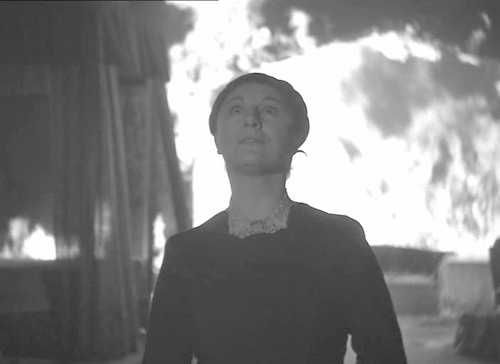 The first one that came to mind was Rebecca, which ends with Mrs. Danvers (Judith Anderson) setting herself and the estate on fire, with the flames lapping around her. I'm kind of giving away the ending, except that the movie begins with Joan Fontaine's character returning to a burned-out estate, saying "Last night I dreamt I went to Manderlay. You can never go back...." After that, the rest of the story is told in flashback. So I'm only giving away how the fire happened; one should recognize two minutes into the movie that something disastrous is going to happen.
The first one that came to mind was Rebecca, which ends with Mrs. Danvers (Judith Anderson) setting herself and the estate on fire, with the flames lapping around her. I'm kind of giving away the ending, except that the movie begins with Joan Fontaine's character returning to a burned-out estate, saying "Last night I dreamt I went to Manderlay. You can never go back...." After that, the rest of the story is told in flashback. So I'm only giving away how the fire happened; one should recognize two minutes into the movie that something disastrous is going to happen.
Laird Cregar gets caught in a fire in the climactic scene of Hangover Square. I didn't think about it when I first blogged about the movie back in the summer of 2008, but in some ways it's a neat bookend to the film when you remember that Cregar disposed of one of his murder victims by throwing it on a Guy Fawkes Night bonfire.
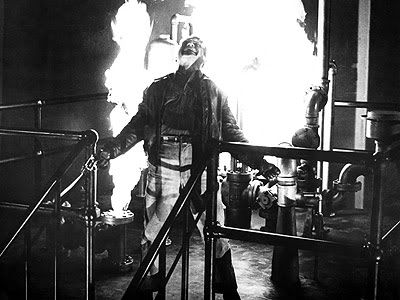 James Cagney makes it to the top of the world, only for that top to be at an oil refinery that catches fire, in White Heat. Perhaps I should have thought of this one first since it's probably the single best-known burning alive scene, and one of the great Hollywood endings. To be honest though, I only came up with it after a lot of the other stuff in this post.
James Cagney makes it to the top of the world, only for that top to be at an oil refinery that catches fire, in White Heat. Perhaps I should have thought of this one first since it's probably the single best-known burning alive scene, and one of the great Hollywood endings. To be honest though, I only came up with it after a lot of the other stuff in this post.
I suppose I could mention any of the films about Joan of Arc, who was burned at the stake for whatever reason, which was likely political whatever lessons one learned in school said.
And then there are the movies where characters try to kill another character by burning them alive. The lynch mob in Fury sprung to mind. They burn the county jail where he's being held, and everybody thinks he's been killed, to the point that it causes a national outrage and there's a huge circus of a murder trial held for the people who burned the place down. Tracy, of course, survived the fire, so the dramatic tension of the movie is the decision Tracy has to make.
Lionel Atwill gets horribly disfigured in a fire in the opening scene of Mystery of the Wax Museum. Burning him alive was an accident, although the fire was only an accident to the same extent that Shelley Winters being knocked out of the canoe in A Place in the Sun was. The wax museum was failing and Atwill's business partner figured burning the place and taking the insurance money wouldn't be the worst thing in the world.
A different sort of attempted murder by burning comes in the James Bond movie Diamonds Are Forever. There, the bad guys trap Bond in a casket and send it through a crematorium oven. Somehow, I don't think they'd burn the casket in real life. Bond, of course, survives.
What's your favorite burned alive scene?
Posted by
Ted S. (Just a Cineast)
at
8:07 AM
0
comments
![]()
![]()
Tuesday, February 3, 2015
Another round of FXM repeats
I've mentioned quite a few times how it seemed the programming strategy of the old Fox Movie Channel, and now that of FXM Retro which replaced it, is to take a small number of movies out of the vault and run them a whole bunch of times for a few months, and then to put those movies back in the vault for a long time to replace them with new movies. Tomorrow's schedule contains a pair of movies that I blogged about in the early part of 2011, for example.
Roxie Hart, in which Ginger Rogers plays a chorus girl who tries to get away with murder, is on at 4:35 AM tomorrow. In fact, it was also on this morning at 6:00 AM. It's not at all uncommon for a movie to show up on consecutive days on FXM Retro; in fact, I think I've seen quite a few cases of some movie finishing the Retro part of the FXM schedule, and then being the first movie on the next morning. Unfortunately, that morning doesn't always begin at 3:00 AM any more. Sometimes, the last movie of the prime time part of the schedule runs past 3:00 AM, and the first part of the Retro schedule might only begin at 4:00 AM.
Ven Heflin leads a group of confederate soldiers leading his men on The Raid of St. Albans, VT, at 10:30 AM. This one I actually mentioned just last September when it was on the schedule then, but I have to admit I didn't pay much attention to whether it was on much between September and now. FXM doesn't replace all of its movies in one fell swoop, but however they replace their films, the result is still that there's always a fairly limited selection on FXM Retro.
At least the programming block is still limping along. As I sais when they introduced FXM on January 1, 2012, I expected the more recent movies with commercial interruptions to take over the entire schedule within six months. Three years on, and there are still some old movies, including some I've never seen before. Hooray for minor miracles.
Posted by
Ted S. (Just a Cineast)
at
7:22 AM
0
comments
![]()
![]()
Labels: FXM
Monday, February 2, 2015
Frank Lloyd, 1886-1960
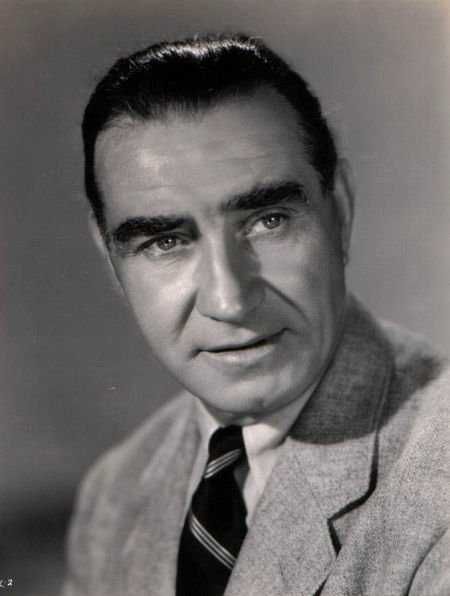 Today marks the birth anniversary of director Frank Lloyd. Lloyd started his career as an actor in the early 1910s, making a bunch of shorts over a couple of years. But he quickly moved into directing and made something like 70 shorts in the 1910s, and a further 30 movies in the 1920s; I'm not certain how many of the 1920s movies are features, although certainly by 1924 he made The Sea Wolf, based on a novel by Rafael Sabbatini, who also gave us Captain Blood, The Black Swan, and Scaramouche.
Today marks the birth anniversary of director Frank Lloyd. Lloyd started his career as an actor in the early 1910s, making a bunch of shorts over a couple of years. But he quickly moved into directing and made something like 70 shorts in the 1910s, and a further 30 movies in the 1920s; I'm not certain how many of the 1920s movies are features, although certainly by 1924 he made The Sea Wolf, based on a novel by Rafael Sabbatini, who also gave us Captain Blood, The Black Swan, and Scaramouche.
Lloyd is probably best remembered for his 1930s work, though. He won an Academy Award for directing Cavalcade, and would be nominated again two years later for Mutiny on the Bounty. There's a story involving the Cavalcade win. Will Rogers was hosting the Academy Awards that year, and when it came time to announce the winner for Best Director, Rogers didn't name the movie, only ending his speech with "Come and get it, Frank!" The only thing was, Frank Capra had been nominated for Lady For a Day, so there was the sorry spectacle of two directors coming up to the podium to receive their award, only for Capra to have to be told he didn't win. Poor Capra, although he'd probably be considered to have the last laugh since he would go on to win three Oscars and have a longer list of beloved movies.
Oh, and how could I forget Frank Lloyd's direction of Berkeley Square or The Howards of Virginia?
Posted by
Ted S. (Just a Cineast)
at
6:00 PM
0
comments
![]()
![]()
The Wind and the Lion
I finally got around to watching the movie The Wind and the Lion when it showed up on TCM yesterday morning. It's available on DVD if you want to watch and don't want to wait for the next TCM showing.
The movie is very loosely based on a 1904 incident involving the kidnapping of Ion Perdicaris and his adult stepson from their palatial estate in Tangier, Morocco. In the movie, however, to provide more dramatic tension, the kidnapping victim has been changed into an American widow, Eden Perdicaris (Candice Bergen). At the beginning of the movie, she's shown at a luncheon on the estate with her two young children, when Mulai Ahmed er Raisuli (Sean Connery) and his men invade the place, killing the wine server and taking the three Americans hostage. Raisuli is a Berber, living in the Atlas Mountains away from the coastal cities, and is generally considered the last of the Barbary Pirates.
News of the kidnapping gets back to America, of course, and President Theodore Roosevelt (Brian Keith) is none too happy about it. Ever the arrogant bully, Roosevelt declares that he wants Perdicaris alive, or Raisuli dead. That, of course, isn't going to be all that easy. Raisuli is somewhere out in the desert, while the government of Morocco is a fairly weak one. Everybody goes through the Bashaw of Tangier, who is more or less the gatekeeper for the Sultan of Morocco, who keeps to his palace in Fez. Meanwhile, the various great powers of Europe have all set up concessions in Tangier and are playing off one another and the Bashaw, implicitly threatening the independence of Morocco. Adding the Americans to the mix isn't going to make life any easier for the Moroccans, or the Europeans.
The action switches back and forth between the Moroccan desert and the United States. Raisuli has a lot on his hands what with the feisty woman he's kidnapped. Eden, understandably, isn't going to take being a kidnap victim lying down. She challenges Raisuli and his values whenever she can, laying the groundwork for the inevitable escape attempt that seems to be a part of the plot of most kidnapping movies. Along the way, though, she begins to have grudging respect for Raisuli, even if the kidnapping might destroy the one thing he values most, which is the independence of his people. Roosevelt, meanwhile, continues to be a jerk to everybody around him, brutishly going through life and plotting to use blunt force in the form of a contingent of Marines to rescue the Perdicaris family and screw over all the Europeans. Why this wouldn't lead to war is briefly referenced when some of the American diplomatic corps already in Tangier talks about the possibility of a world at war, but seems to be of little interest to Roosevelt, who only cares about displays of his masculinity.
Eventually, an agreement is made to accede to Raisuli's demands which, other than money, concern the independence of the Berbers and are therefore of little concern to the Americans since that would be an internal matter in Morocco. But the attempt to return the Perdicaris family to US Marines goes wrong as the handover gets waylaid by a batallion of German soldiers, something that never happened in real life. Meanwhile, Raisuli and Eden gain further grudging respect for one another.
The Wind and the Lion has a story that goes all over the place, it seems, making it seem much longer than the two hours it is. Sean Connery is quite good as Raisuli, ultimately making sympathetic a man who claims to be a man of God who wants liberty for his people (at least in this world), while in reality he's probably just a selfish, power-hungry man. Bergen is also good, although in many ways she's playing the cut-out character of the unnaturally strong and independent-minded woman in an era when it was a man's world. Brian Keith's Roosevelt is supposed to be a positive character, but I find that the more I read about Theodore Roosevelt, the more negative view I have of him. In that regard, Keith's characterization succeeded, but for me it wasn't in the way the director intended. Roosevelt here is even more self-abosorbed than Raisuli, and intent on showing off that he's more powerful and manly than everybody else, and woe betide anybody who disagrees with him.
The portrayal of Roosevelt is for me a big problem I have with the movie. His scenes really drag the movie down, and I found myself wishing
Posted by
Ted S. (Just a Cineast)
at
11:02 AM
0
comments
![]()
![]()
Labels: Sean Connery
Sunday, February 1, 2015
Oscar-nominated shorts again
Now that we've reached February 1 and the beginning of TCM's annual 31 Days of Oscar, we get a bunch of movies that were nominated for at least one Oscar. The same is true of many of the shorts, although TCM's schedule page often includes featurettes on movies under the rubtic of "shorts"; most of those, I think, wouldn't have been nominated for any awards.
Unfortunately, they still don't hav the rights to the animated shorts, which as I understand it reside with with Time Warner's corporate cousin Cartoon Network/Boomerang. So we're left with the live action shorts, which are interesting if a bit tedious after a while because the selection of shorts available for 31 Days of Oscar is even more limited than the feautres. I don't think any of the Traveltalks shorts was ever nominated for an Oscar, so all of those are out. Offhand, I think the closest we're liable to get to a Traveltalks short is Calgary Stampede, which will be coming up at the weekend, and which I've mentioned in three previous Februaries.
Two shorts I briefly mentioned in the same blog post last year show up in the next 24 hours. First up, at 9:50 PM after the documentary And the Oscar Goes To..., is You Can't Win, a Pete Smith short (boy does Pete Smith show up a lot; MGM obviously pushed him in the one-reel shorts category since he and the Traveltalks shorts were the two prominent series of one-reelers they had at the time. Tomorrow morning we get another Pete Smith short, Romance of Radium, at about 7:04 AM.
Posted by
Ted S. (Just a Cineast)
at
8:23 AM
0
comments
![]()
![]()
Labels: Short
